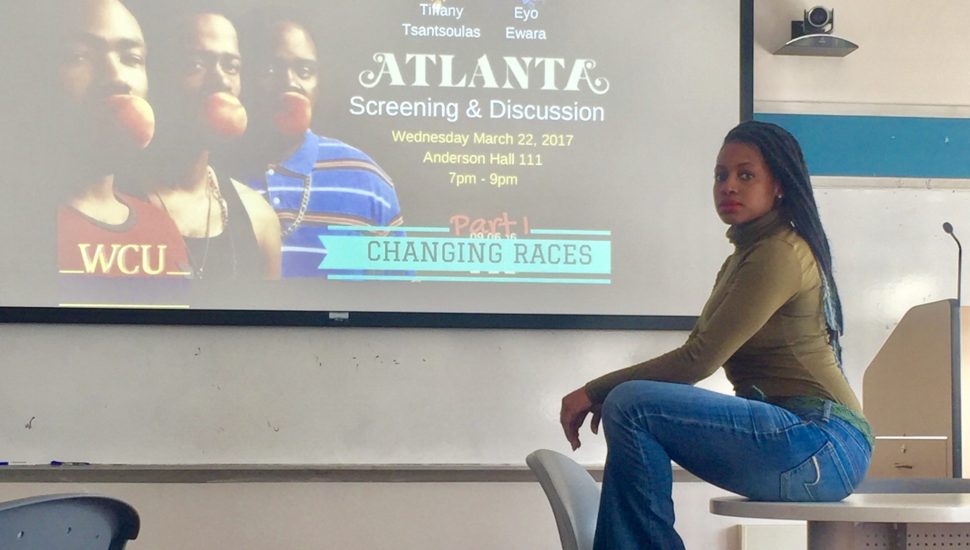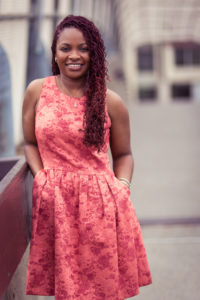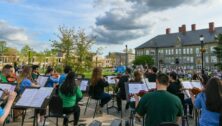Faculty of WCU’s College of Arts, Humanities Embraces Transformative Power of Liberal Arts

 West Chester University’s College of Arts and Humanities embraces the transformative power of a liberal arts education and its ability to change lives. The liberal arts teach students critical thinking skills, creativity, and the value of others’ perspectives.
West Chester University’s College of Arts and Humanities embraces the transformative power of a liberal arts education and its ability to change lives. The liberal arts teach students critical thinking skills, creativity, and the value of others’ perspectives.
The college’s professors represent diverse backgrounds, yet share a common passion for community engagement.
Dr. Denise Polk of the Communication Studies Department became interested in her field as an undergrad, having been intrigued by the study of interpersonal relationships, and decided to push her academic career in that direction. After starting her teaching career at Bridgewater College in Virginia, she came to WCU and immediately fell in love with the campus and town.
Dr. Polk teaches her students skills that translate to their everyday lives and interactions.
“I want my students to recognize what is going on (in their own lives), give it its proper name, and understand the dynamics of their interpersonal relationships,” she said.

Her students also learn by assisting her research. In 2012 and 2014, she accompanied students of the honors college to South Africa where her primary responsibility was to help them participate in a significant research project. They were a part of the entire process, from experimental design to data analysis, and created meaningful experiences.
In addition to her work at the college, Dr. Polk has made it a point to become involved in the greater community. She recently began serving as a member of West Chester Borough Council, and has been a driving force behind its pilot program for compost collection.
Dr. Laquana Cooke of the English Department started her undergraduate experience as a scholarship basketball player for the New Jersey Institute of Technology in Newark. After her first year, she decided to focus on academics, ultimately graduating with a double major and double minor. Prior to earning her Ph.D. at Rensselaer Polytechnic Institute and arriving at WCU, she worked in film and television production, and collaborated with many nonprofits dedicated to helping inner-city kids learn media production skills.
Dr. Cooke’s focus on digital rhetoric helps students look at how people use technology to persuade, inform, entice, and influence others.
“We have a reciprocal relationship with technology,” she said. “Tech is non-human, but it speaks to who we are and shapes how we communicate. My goal as a professor is to work at the intersection of the community, the university, and the game industry.”

Dr. Cooke is the organizer and driving force behind WCU’s new iCamp Academy. She also works as a game design advisor for Games for Change Student Challenge, a subsidiary of Games for Change, a New York City-based nonprofit that facilitates the creation and distribution of social impact games that serve as critical tools in humanitarian and educational efforts. Dr. Cooke believes these programs can help high school students learn valuable skills and make their own media for change.
After earning her Ph.D. at Penn State, Dr. Rónké Oké of the Philosophy Department was attracted to WCU by its distinct entanglement with race and social justice, particularly:
- the borough’s connection to the Lenni Lanape Native American tribe and the Abolitionist movement
- Frederick Douglass’s last public lecture at WCU
- its proximity to and the historical significance of Lincoln University, Cheyney University, and the city of Philadelphia
Dr. Oké loves the supportive tenor and disciplinary makeup of the Philosophy Department and the faculty’s interest in diversity, race, and feminism.
“I saw that everyone at the university stays,” she said. “Everyone I encountered during my campus visit had been at the university for 16, 20, 24 years, and longer. I thought to myself, something good must be going on at West Chester to keep people there for so long.”
[uam_ad id=”58459″]
Advertisement
Dr. Oké focuses her scholarship on race and identity formation with a particular emphasis on transnational conceptions of Blackness, the intersection of race and gender, and multicultural social justice. Accordingly, she studies how our identities impact our personal ethics and relationships, both on a local and a global scale. Twentieth-century French philosophers like Jean-Paul Sartre, Emmanuel Levinas, and Frantz Fanon inform her work, as does American historian and sociologist William E.B. Du Bois.
Dr. Oké has found West Chester to be a very hospitable, nurturing space, and is working to support the community by incorporating Service Learning into her ethics courses and hosting public events on race and racial identity.
This past semester, students from Dr. Oké’s “Critical Philosophy of Race” course hosted two screenings and panel discussions on the topic of transracialism. She wants her students to understand that their lives are connected to the lives of other people, and she hopes they will have a transformative experience that changes the way they think, relate to others, and see themselves in the world.
Michelle Obama once said the arts and humanities “give us hope in the moments of struggle and to bring us together when nothing else will.”
The faculty of WCU’s College of Arts and Humanities certainly embrace that ideal.
Click here to learn more.
[uam_ad id=”58462″]
Connect With Your Community
Subscribe to stay informed!
"*" indicates required fields







![95000-1023_ACJ_BannerAd[1]](https://vista.today/wp-content/uploads/2023/03/95000-1023_ACJ_BannerAd1.jpg)








































